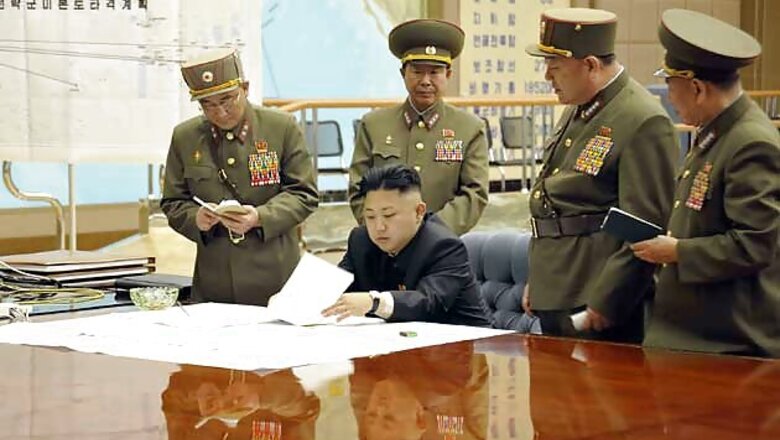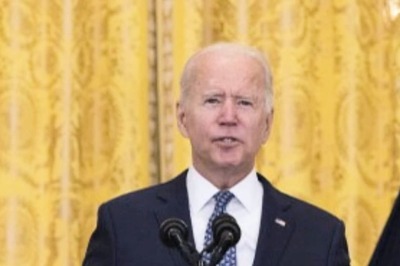
views
Washington: North Korea's young leader Kim Jong-un is using his forebears' time-tested "crazy-guy-in-the-neighborhood" strategy, senior US officials say, but with a provocative new twist - aiming Pyongyang's threats directly at the United States. There are indeed signs of an earlier method in what might seem like Kim's rhetorical madness, which US policymakers say is patterned after more than a half century of rule over the reclusive state by his father and grandfather.
But with a large degree of uncertainty surrounding Kim and limited US intelligence on North Korea's leadership, Washington is still trying to gauge how far the untested 30-year old leader might go to prove himself to his people, and his generals, or to make a belligerent point to South Korea's new president and the world. North Korea's surprise announcement on Tuesday of plans to restart a long-shuttered nuclear reactor, while not issued by Kim personally, could further raise the stakes in his standoff with the West.
"All bets are off on whether this guy recognizes where the off-ramps are," one senior administration official said. "We don't have enough history with him to know whether or not he has the sophistication that his father displayed in dealing with diplomatic confrontation."
This official and others spoke on condition of anonymity to discuss months of North Korean threats and actions, including missile and nuclear tests, that pose a challenge to President Barack Obama's policy of "strategic patience" toward Pyongyang. That policy - a refusal to offer new incentives to Pyongyang until it suspends its disputed nuclear program - has yielded little but defiance since Obama took office in 2009.
Joseph DiTrani, formerly the US intelligence community's top expert on North Korea, said the "cadence change" displayed by Kim's tough talk and military gestures, such as this year's nuclear test, indicate he is under heavy pressure from the country's military elite. "He's got to present (an image of) ... strength to those elements," DiTrani said.
Though Kim has fired or demoted some generals since taking power, Pyongyang's military leadership remains a political force to be reckoned with. He has sought to placate them by paying homage to the "Military First," or Songun, philosophy his late father, Kim Jong-il, preached to justify use of impoverished North Korea's scarce resources to build a 1.2 million-strong army and a nuclear weapons program, Asia experts say. Still, the Obama administration insists there is no cause for alarm.
Pyongyang's assertion over the weekend that it had entered a "state of war" with South Korea over its joint military drills with the United States, has not led to corresponding movements of North Korean forces, the White House said. And while Pyongyang's bluster may be unsettling, images of Kim posing in front of maps portraying missile targets on the US mainland require a stretch of the imagination, given that North Korea has yet to prove it has mastered ballistic technology capable of reaching American shores.
US officials insist they are anything but nostalgic for Kim Jong-il, who was seen by Washington as dangerous though at least predictable. He issued threats and even acted militarily to get the world's attention but would draw the line at open armed conflict, using crises he provoked as leverage in international negotiations.
The younger Kim, little known to the West when he took power in December 2011, appears intent on stretching the limits of his family's playbook. He has taken the spotlight not only to issue some threats in person but has gone a step further, hurling them at his country's superpower foe.
"There are clear differences in style and tone (between father and son)," another senior U.S. official said. "He is much more personally involved in the forefront ... and these threats are more specific and more directly oriented at the United States this time around."
But this official insisted that even with this new variation of what he called North Korea's "crazy man strategy," Kim would not succeed in getting Washington and its allies to "buy them off" with aid, fuel or other concessions, as previous US administrations have periodically tried to do.
Obama himself offered food aid to North Korea last year, under stringent monitoring terms to ensure it wouldn't be diverted to the military, in return for a moratorium on nuclear and long-range missile tests. The deal imploded less than three weeks later when Pyongyang announced plans for what it called a satellite launch and US officials said was a missile test.
Some US officials believe Pyongyang's bellicosity is aimed primarily at a domestic audience. They see Kim trying to keep his vast, poorly paid army motivated with anti-U.S. propaganda and improve his status among North Korea's largely dirt poor population by standing up to foreign enemies, even as he seeks to cement his grip on power.
But there is growing concern that Kim's inexperience coupled with his drive to prove himself could lead to a limited strike on a South Korean target, such as a ship or border post, or that the two sides could stumble into military confrontation. "The greater likelihood is miscalculation," former US Defense Secretary Leon Panetta told CNBC on Monday. "And if they do something that escalates quickly, that's the greater danger."
US officials and independent Korea watchers alike acknowledge, however, they are so short on personal information about Kim that predicting his behavior remains a guessing game. The Obama administration's original hopes that Kim would turn out to be a reformer have yet to materialize and seem unlikely to any time soon, US officials say.
Despite that, most Korea watchers believe Kim is a rational actor who understands his military is no match for Seoul and its US ally and that straying too far from historic North Korean practices could jeopardize his own political survival. Kim dialed down the harsh rhetoric in his latest speech this week when he avoided repeating recent threats to attack South Korea and the United States.
And he has occasionally tried to project a warmer image. Weeks after ordering an internationally banned nuclear explosion, he indulged his passion for basketball by hosting former NBA star Dennis Rodman. "An awesome kid," said Rodman, who has now spent more time with Kim than any Western officials ever have.



















Comments
0 comment